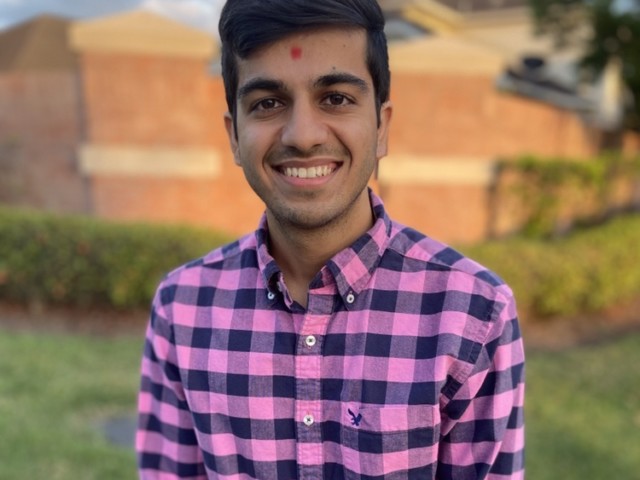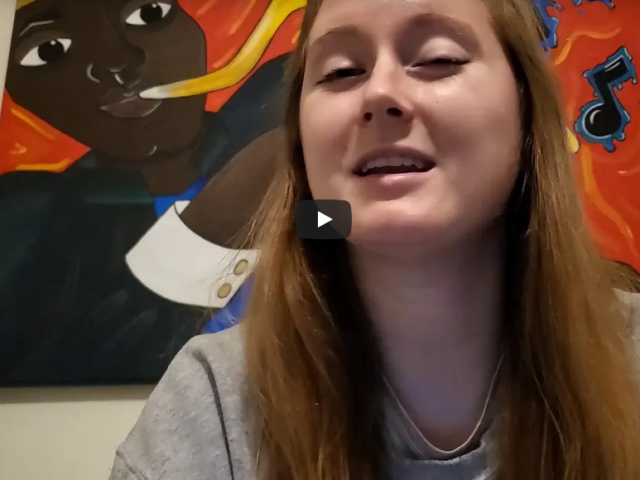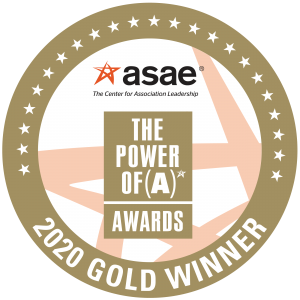Eye on Optometry
Meet Dr. Parres Wright, Assistant Professor at Midwestern University – Chicago College of Optometry. This video shows how she navigates educating her students during Covid as well as her passion for her students and for her profession. She is proof that academic optometry is a rewarding and fulfilling career path.
Dr. Wright is on the following social media platforms:
Instagram: @dr.wrightisright
Twitter: @drwrightisright
YouTube:dr.wrightisright
Podcast: Capital W

Guest author Shail Gajjar
Read Shail’s Part 1: Don’t Let Eyes Be The Demise
Northcote Parkinson, 1942
Parkinson’s Law: “Work expands so as to fill the time available for its completion.”
Less time studying, and better grades. Though factual, it sounds entirely fictional. Hi all, my name is Shail Gajjar and I’m a second year at The University of Houston College of Optometry. I hope to share some lessons and insights from my first year in the Doctor of Optometry (OD) program.
I recall a time when I used to dumbfoundedly wonder how my classmates juggled their commitments. Whether it be marriage, taking care of a pet, volunteering every weekend, having a kid, playing on a regional ultimate frisbee team, working a part-time job, or commuting from home, the people around me somehow found a way to fit a doctorate program into their schedules. The question I used to wonder was how? As is, I felt there wasn’t enough time to study, so how could someone – with substantially less time – still manage to sufficiently study. What was the secret?
While I cannot speak on their behalf, here’s the answer I came to one semester later:
Lesson 2: Quality ≥ Quantity. Per Parkinson’s Law, your results will improve when you spend less time studying more. Treat each studying session like your last, as if the final is the next day.
You’ve probably already been told about the importance of time-management. I wish not to expand that dialogue. My emphasis is instead time–usage. To illustrate this, consider the following scenario:
Let’s say you take the Optometry Admissions Test (OAT) in 2 months. I want you to imagine how a typical day of studying would go. More specifically, imagine how many hours you would study in a day.
WHAT IF I told you there was an issue with your registration (you can’t reschedule) and you now have 2 weeks. AS IF THIS WASN’T ENOUGH, you cannot study any more per day than you did previously. What would you change? How would your days of studying evolve?
With absolute certainty, my stress would go through the roof. That variable aside, however, I can also say my time-usage would significantly change. I would undergo a paradigm shift. Rather than casually studying the material for the day and taking breaks as I please, I would spend each and every single minute of that studying session with focus and concentration. My breaks would be limited to an “as-needed” basis for the sole purpose of expanding my studying. Such new behaviors would be rooted to a sense of urgency; the realization that each minute matters would push me to spend the limited time that I had with maximal efficiency.
THIS, my friends, is the key that revolutionized how I approached studying my second semester of first year. Sure, scheduling in activities for the sake of my mental health decreased the available amount of time that I had, but enhancing my time-usage allowed me to cover more material in less time.
Now… this might sound really intense… And to be frank, as I re-read the points I make above, it does sound a little forward. Yet, I can say that employing the methods mentioned will allow you to free up more time for yourself. And so, whether you’re group studying or studying by yourself, always ensure you’re studying with a sense of urgency. It can be really easy (and tempting) to sit back, relax, and casually flip through PowerPoint slides. Or maybe have a few conversations with your friends, order some food, and so forth. Unfortunately, such behaviors will only prolong your studying time and ultimately restrict you from doing the things that you actually enjoy.
Study in an environment that keeps you motivated, but don’t make studying longer than it needs to be. All of this brings me to…
A variation of Parkinson’s Law:
FIRST, schedule doing the things that you love. Work will THEN expand to fill the available time remaining for its completion, assuming you’re spending that time correctly.
Acknowledgements: Many thanks to Lakshya Trivedi (more info at his website themdjourney.com or his YouTube channel TheMDJourney) for teaching me this concept, and to HH Pramukh Swami Maharaj (learn more at pramukhswami.org) who taught me its application.
Easy Anyama, 2nd year optometry student at the University of Houston, College of Optometry continues his journey in optometry school. Episode 2 of Easy on the Eyes is below. Revisit Episode 1.
Are you an optometry student (or know one) who is interested in sharing your story with us? Please message ASCO’s Director of Communications, Kimberly O’Sullivan, at kosullivan@opted.org.

Guest author Shail Gajjar
I get it. It’s your first year of optometry school. You’re nervous. Your anxiety has peaked. Your ambitions are high. You refuse to fail, and you’ll use every ounce of your strength and mental energy to safeguard your success. I was there too, and I admire your dedication to the profession. No one wants to fail, and yet it remains a possibility for each one of us. The simplest of mistakes, the smallest of missteps and you’ll find yourself in a position you would have never imagined otherwise. My name is Shail Gajjar and I am now a second year at The University of Houston College of Optometry. My first year of optometry school was full of ups and downs, and I hope to share some of the lessons I learned with you all.
Lesson 1: Your grades matter, sure, but so does your mental health. Find your passion, and treat it like another class.
I’m sure you’ve heard one person or another stress the importance of taking care of yourself in graduate school. If you’re anything like me, I’m sure you also shrugged off this piece of advice. It’s easy to let this fly over your head. And to highlight its importance, I would go so far as to say this is one of the most important lessons I learned in optometry school.
I can’t tell you the number of students I saw pulling all nighters, sacrificing sleep, or downing gallons of coffee or energy drinks just to squeeze in as much studying as humanly possible. I found myself in that very same position during our first exam week. The scariest part of all, however, was the difference I saw in myself during the first week of school versus during finals week. During the first week of school, I was vibrant, energized, social, and excited. During finals week, I was a literal zombie – dead, emotionless, lacking motivation, and dragging myself to the end. This observation is true for anyone who forewent self-care in my class.
On this note, I must ask: Why is it that society only cares about the product, but never the process? We always ask what our peers scored on the exam, but never how they were doing in the preparation for that exam. And if we do ask how they studied, it’s with the intent of learning their study habits so we can score an A on the exam next time around. I admit, perfect grades are ideal. But at what cost to attain those perfect scores? If I have to be honest, if getting a 4.0 means sacrificing your mental health, then the grades aren’t worth it. It comes down to one simple question you must ask yourself:
How many times can you burn yourself out before the damage is irreversible?
Earning a Doctor of Optometry takes 4 years. There are two ways to get through this journey:
- Accelerate as fast as possible and burn the majority of your fuel in the first year. Score high, even if it means emptying your tank.
- Put yourself in cruise control. Stay consistent, take care of yourself, and expend your fuel equally through the four years of school.
The first semester of optometry school I embraced strategy 1. After just a few months of school, I found myself exhausted both emotionally and physically. Half of my winter break was spent sleeping, watching movies, and trying to somehow scavenge enough energy to get through the next semester.
I knew there was no way I’d be able to get through the program with the habits I had established. I made a few key changes. First, I made my hobbies and passions a priority; I treated them like another class. I scheduled two “classes” that I would attend no matter how many exams I had on the horizon. The first class was Fridays from 4:00 – 8:00 PM. The second class was on Sundays and split into two time intervals: 2:00 – 4:00 PM and 7:00 – 10:00 PM.
Class 1: Following my clinic practicum lab, I made it a point to socialize with my friends. Whether that meant going to a nearby park to play sports, accompanying them to a restaurant, or heading to the recreation center, Fridays were seldom spent studying.
Class 2: Beginning at 2:00 PM, I spent my time at the BAPS Shri Swaminarayan Mandir in Stafford, Texas. I attended the Sunday classes they held for adults. The calm, divine aura of the temple served as a weekly reminder that there is more to life than taking one exam after another – I was reminded the end goal of this optometry program was treating patients, not taking exams. From 4:00 – 7:00 PM, I went to a local Starbucks and spent some time studying. From 7:00 PM onwards, I came back to the temple and had dinner there. Ending my week with spirituality allowed me to recalibrate my identity.
No matter how busy you get, never forget your sense of happiness. DO IT! Paint that one drawing, shoot those hoops, make that meal, play those video games. As someone who once spent every living hour of the day studying, I promise you spending some of your time taking care of yourself is the better route to go. I am wholly convinced those Fridays with friends and Sundays at the temple were the reasons I was able to stay sane and thrive in my first year of optometry school. I’m happy to report my grades actually improved despite the fact that, objectively, I was spending less time studying.
Naturally, your next thought might be: I get that you were happier and more motivated your second semester, but how does less studying amount to better grades? The answer to this question lies with the second lesson I learned in optometry school. Until then, I thank you for your time in reading this. I hope I was able to provide useful insights and know you’ll do great things.
DISCLOSURE: Optometry school is not easy – the program is certainly serious and challenging, and for good reason. But despite its difficulties, acing optometry school is a realistic aspiration. While there is no one-size-fits-all guide to getting through the program, I hope my lessons will aid you in your optometric journey.
To my future colleagues,
I wish you the best,
Shail Gajjar
OPT II
The University of Houston College of Optometry
Meet Easy Anyama. Easy is a 2nd year optometry student at the University of Houston, College of Optometry. We first met Easy when he was featured in our April 2020 issue of Eye on Education, and we are excited to learn more about him.
Check out his video below and learn more about his journey to optometry school via two NFL mini camps. The NFL’s loss is optometry’s gain.
We look forward to “Easy on the Eyes” Episode 2 and thank Easy for sharing his story with us.
Are you an optometry student (or know one) who is interested in sharing your story with us? Please message ASCO’s Director of Communications, Kimberly O’Sullivan, at kosullivan@opted.org.








